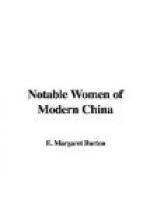Within a few weeks they left Foochow to work among their first parishioners, a people who might well have caused the hearts of the young pastor and his wife to fail, for Hue Yong Mi says of them: “In front of their houses I saw piles of refuse, and filthy ditches. Within, all was very dirty—pigs, cattle, fowls, sheep, all together in the one house. Not a chair was there to sit on. All went out to work in the fields. They had no leisure to comb hair or wash faces.... None knew how to read the Chinese characters. Some held their books upside down; some mistook a whole column for one character.” Mrs. Hue and the children were very ill with malarial fever while in this place, but in spite of all their hardships, a good work was done.
Mrs. Hue was as earnest a worker among the women as was her husband among the men, telling the good news to those who had never heard it, and strengthening her fellow-Christians. Many a programme of the Foochow Women’s Conference bears the name of Mrs. Hue Yong Mi, for she could give addresses and read papers which were an inspiration to missionaries and Chinese alike. Her friend, Mrs. Sites, has written especially of her influence on the women whose lives she touched: “In the stations where the Methodist itinerancy sent Rev. Hue Yong Mi, this Christian household was something of a curiosity. The neighbouring women often called ‘to see’ in companies of three to twenty or more, and Mr. Hue expected his wife and children to preach the gospel to them just as faithfully as he did from the pulpit. There are many hundreds of Chinese women to whom this lovely Christian mother and little daughters gave the first knowledge of Christ and heaven.” The same friend says of this wife and mother, “In privations oft, and in persecutions beyond the power of pen to narrate, she has become a model woman among her people.”
In 1865, not long after a period of severe persecution, and while their hearts were saddened by the recent death of their little daughter, Hiong Kwang, another baby girl was born to Mr. and Mrs. Hue, and named Precious Peace, the Chinese for which is King Eng. Born of such parents, and growing up in such an environment, it is perhaps not surprising that unselfishness, steadfastness of purpose, and courage, both physical and moral, should be among the most prominent characteristics of Hue King Eng. One of the clearest memories of her childhood is of lying in bed night after night, listening to the murmur of her father’s voice as he talked to someone who was interested in learning of the “Jesus way,” and hearing the crash of stones and brickbats, the hurling of which through the doors and windows was too frequent an occurrence to interrupt these quiet talks.




